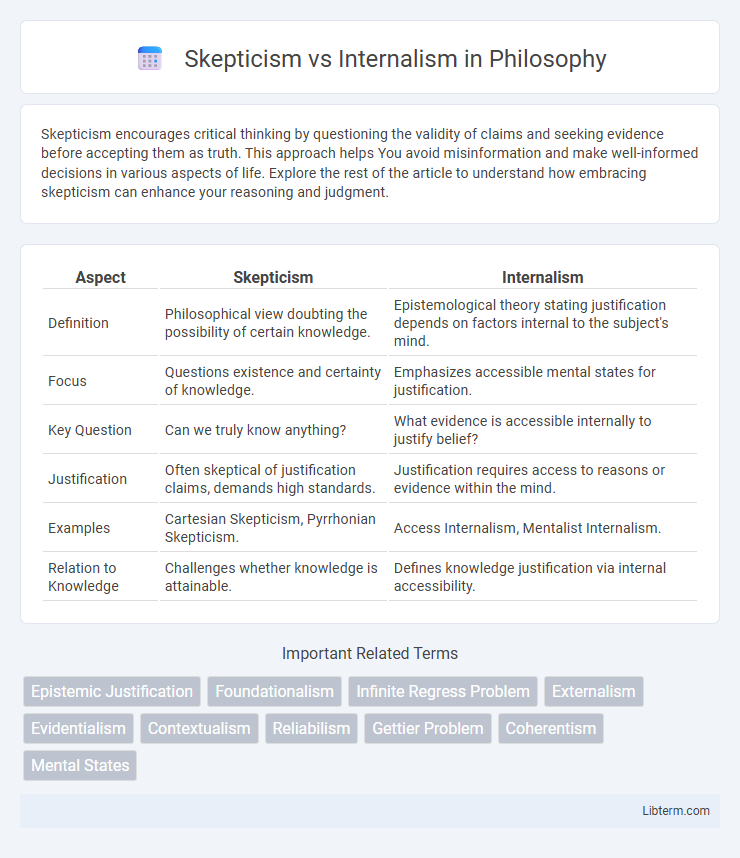Skepticism encourages critical thinking by questioning the validity of claims and seeking evidence before accepting them as truth. This approach helps You avoid misinformation and make well-informed decisions in various aspects of life. Explore the rest of the article to understand how embracing skepticism can enhance your reasoning and judgment.
Table of Comparison
| Aspect | Skepticism | Internalism |
|---|---|---|
| Definition | Philosophical view doubting the possibility of certain knowledge. | Epistemological theory stating justification depends on factors internal to the subject's mind. |
| Focus | Questions existence and certainty of knowledge. | Emphasizes accessible mental states for justification. |
| Key Question | Can we truly know anything? | What evidence is accessible internally to justify belief? |
| Justification | Often skeptical of justification claims, demands high standards. | Justification requires access to reasons or evidence within the mind. |
| Examples | Cartesian Skepticism, Pyrrhonian Skepticism. | Access Internalism, Mentalist Internalism. |
| Relation to Knowledge | Challenges whether knowledge is attainable. | Defines knowledge justification via internal accessibility. |
Defining Skepticism: A Philosophical Overview
Skepticism in philosophy questions the possibility of certain knowledge, emphasizing doubt regarding human cognitive capacities and the reliability of sensory information. Internalism in epistemology argues that justification depends solely on factors accessible to the subject's conscious awareness, contrasting with externalism's emphasis on factors outside the subject's knowledge. Defining skepticism involves understanding its challenge to epistemic certainty and the rigorous demand for evidence that internalism seeks to satisfy through internal access to justificatory reasons.
Understanding Internalism in Epistemology
Internalism in epistemology asserts that justification for beliefs depends solely on factors accessible to the subject's consciousness, emphasizing the importance of introspective access to evidential support. This contrasts sharply with skepticism, which questions the possibility of such accessible justification, highlighting challenges in achieving certain knowledge. Understanding internalism involves recognizing its commitment to the internal accessibility of justification, which serves as a foundational response to skeptical doubts about the attainability of knowledge.
Key Differences Between Skepticism and Internalism
Skepticism questions the possibility of certain knowledge, emphasizing doubt about whether justified true belief can be attained. Internalism holds that justification depends solely on factors internal to a subject's perspective, such as accessible mental states. The key difference lies in skepticism's challenge to knowledge acquisition itself, while internalism focuses on the nature of justification and its dependency on internal cognitive access.
Historical Roots of Skepticism and Internalism
Skepticism, tracing back to ancient Greek philosophers like Pyrrho and Sextus Empiricus, challenges the possibility of certain knowledge through systematic doubt and suspension of judgment. Internalism, rooted in early modern philosophy with figures such as Descartes and Locke, asserts that justification for beliefs depends solely on factors internal to the subject's mind. The historical divergence highlights skepticism's external questioning of knowledge itself, whereas internalism emphasizes introspective access to justifying reasons.
The Central Arguments for Skepticism
Skepticism challenges Internalism by asserting that internal access to one's own mental states is insufficient for certain knowledge, emphasizing the possibility of systematic error or deception such as the brain-in-a-vat scenario. Central arguments for Skepticism include the problem of the external world, which questions the reliability of sensory evidence and the coherence of justified true belief. This perspective critiques Internalism's reliance on internal justification, arguing that external factors contribute fundamentally to knowledge acquisition and are often inaccessible from within.
Internalism’s Core Principles and Assumptions
Internalism in epistemology asserts that the justification of a belief depends solely on factors internal to the subject's cognitive perspective, such as accessible evidence and coherent mental states. Core principles include the requirement that one must have introspective access to the justificatory reasons supporting their beliefs, ensuring that justification is fully available to conscious reflection. This approach contrasts with externalism by emphasizing mental accessibility and the necessity of internal cognitive conditions for epistemic justification.
Skepticism’s Challenge to Internalist Thought
Skepticism challenges internalism by questioning the reliability of an individual's introspective access to their own beliefs and justification. Internalists maintain that justification depends solely on factors internal to the cognitive perspective, but skepticism demands external validation to ensure knowledge is not merely an epistemic illusion. This tension highlights the fundamental dispute over whether epistemic justification must be internally accessible or can rely on externalist conditions.
Internalist Responses to Skeptical Objections
Internalist responses to skeptical objections emphasize the necessity of having access to justifying reasons for beliefs, arguing that knowledge requires internal cognitive awareness of these reasons. Internalists contend that by elucidating the criteria and processes by which one evaluates evidence, one can counter skepticism without appealing to external factors beyond one's epistemic perspective. This approach fosters a framework where justification is tied to internal mental states, enabling agents to address skeptical challenges through reflective evaluation of their own epistemic conditions.
Practical Implications: Knowledge and Justification
Skepticism challenges the certainty of knowledge claims, questioning whether true justification is achievable, while Internalism insists that justification depends solely on factors accessible to the thinker's consciousness. This debate impacts practical decision-making, as Internalism demands that agents critically reflect on their reasons for belief before action, whereas Skepticism urges caution and suspends judgment in the absence of indubitable evidence. Understanding these positions guides the standards for responsible knowledge attribution and influences disciplines like epistemology, psychology, and ethics in evaluating justified beliefs.
Modern Debates: Synthesizing Skepticism and Internalism
Modern debates on skepticism versus internalism focus on synthesizing epistemic frameworks to address the challenge of knowledge justification. Philosophers explore how internalist demands for accessible justification can coexist with skeptical concerns about the limits of evidence and certainty. Contemporary approaches integrate contextualism and reliabilism to reconcile internal access with external truth-tracking conditions.
Skepticism Infographic

 libterm.com
libterm.com